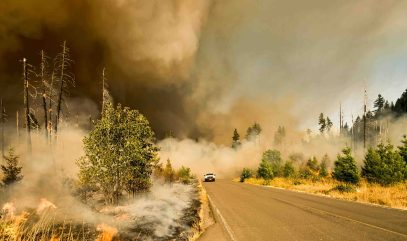Case Study #2: Landrace Grains and The Grain Shed (Post 3 of 4)
The Grain Shed is a vertical co-op located in Spokane, Washington. It was founded by four people: a grain grower, a brewer, a maltster, and a baker. All the grain grown to produce the bread and the beer is grown within 100 miles of the bakery/brewhouse in the Palouse region of Eastern Washington. Within this system of ownership, the grain grower is able to see his grain go from soil to loaf of bread or pint of beer.
Landrace grains, often referred to as heritage or heirloom grains, are ancient, pre-hybridized varieties of wheat, barley, oats, rye and other grains that flourished naturally for centuries throughout the world where they adapted to local environmental conditions.[1]All the grain used to produce The Grain Shed beer is sourced from Palouse Heritage landrace grains. According to brew master Joel Williamson, landrace grains have adapted to their local environment over time and therefore become extremely hardy. They are drought tolerant, resistant to pests, and have “built-in, old school defense mechanisms.” The grains used to make The Grain Shed beer are grown without fertilizers and pesticides and are naturally less water-dependent than commercially grown grains.[2]
“The Grain Shed was founded on the idea of using all local, organic grain. It was a gamble to educate and hope that people will pay the extra price.”
- Joel Williamson, co-owner of Linc Malt and The Grain Shed
Another advantage these landrace grains have over conventionally grown grains is that they help protect soil quality over time. Landrace grains are often re-seeded over the previous year’s crop, a process which reduces tilling of the land. Landrace grains are tilled less than most commercially produced wheat and barley, which are tilled each season, and therefore sequester more carbon while preventing soil erosion. Additionally, Palouse Heritage applies "green manure" cover crop every fourth year to fix nitrogen and add biomass to the soil so when they do till the results are beneficial to the health of the soil.[3]
In addition to soil health, landrace grains also have a positive impact on human health. Toxic chemicals, like glyphosate, are starting to show up in our food supply. This is a problem as recent studies uncover links between the popular weed killer and cancer in humans.[4] Palouse Heritage farmer, Don Sheuerman, sees chemical-dependent farming as a threat to human health which is a big part of what drives him towards revolutionizing our farming practices. In a 2019 article in the Spokesman-Review, Sheuerman is quoted as saying “Chemical farming is all synthetic inputs, all carbon-based,” He goes on to explain that “the soil in Eastern Washington has been ruined by 50 years of dumping glyphosates and other poisons into the land.”[5] Healing our lands will take time. Using biological processes with heartier landrace grains is a step in the right direction.
As a farmer, growing perennial grains is an investment. These crops tend to take 7-10 years to develop large enough yields to be commercially viable. Conventionally grown wheat and barley have been bred to have high yields and high sugar content (required for producing alcohol) right from the first planting. Therefore, commercially grown annual grains can be more lucrative for a farmer. Landrace grains are also a hefty investment for The Grain Shed. Using these perennial grains costs four to five times more than a commercial price of malt from a conventional malting company. But Williamson thinks that it’s “sad and boring that all breweries are using the same grains”. He goes on to explain that exclusively sourcing landrace grain for The Grain Shed is more of an artisanal choice rather than one of economic development. These grains tend to have a more unique flavor profile than conventionally grown grain. They also have an added health benefit. Since their roots grow deeper in the ground than traditionally grown grains, landrace grains tend to have higher mineral content because their roots extract more nutrients from the soil.[6]
In the next post, I will share my conclusion of this four-part blog series on sustainable beer production.
Read Part 1 - Sustainable Beer: Two Examples from the Craft Beer Industry (Post 1 of 4)
Read Case Study #1 - Water Conservation and Hopworks Urban Brewery (Post 2 of 4)
[1]Palouse Heritage. n.d. Palouse Heritage.Accessed May 31, 2019. https://www.palouseheritage.com
[2]Williamson, Joel, interview by Kara Odegard. 2019. (May 31). —. 2019. "email." Spokane: email interview b/w Kara Odegard & Joel Williamson, June 9.
[3]Same as above.
[4]PBS. 2019. "What you need to know about a popular weed killer's alleged link to cancer." PBS News Hour.April 8. Accessed June 30, 2019. https://www.pbs.org/newshour/health/what-you-need-to-know-about-a-popular-weed-killers-alleged-link-to-cancer
[5]Toor, Rachael. 2019. "The Grain Shed's owner: 'I grow beer and bread'." Spokesman ReviewD8.
[6]Upper Valley Seed Savers. 2019. Heritage and Landrace Grain Project.Accessed June 2, 2019. http://uppervalleyseedsavers.pbworks.com/w/page/50322071/HERITAGE%20and%20LANDRACE%20GRAIN%20PROJECT
Read More
Reject the business case for sustainability: The 1980s wants its business case back
They say a rising tide raises all boats. But there isn’t any raising to be done when the tide no longer comes into the bay – all boats remain stranded. We are often asked about the business case for sustainability. For y
Protect Your Community or Organization with a Climate Action Plan
Introduction Our changing climate impacts every aspect of our lives—our economy, our communities, and the environment—in ways both visible and unseen. While scientists and environmental organizations have long recognized
Witnessing the world of sustainable business firsthand
As a young student with a passion for climate justice and sustainability, it always felt like a contradiction to pursue a degree in business. From what I had witnessed, businesses didn’t necessarily operate ethically. Mu
Interning with Purpose: My Journey with Measure Meant
From January to May 2024, I had the distinct pleasure of working with Measure Meant as an Operations Intern. As a graduating senior at Gonzaga University, I had not planned on pursuing another internship in my final seme




